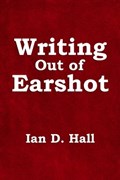“Never talk in front of Dylan Thomas,” they said as they consumed their pints and spoke of their woes and tribulations, and of the weird relative coming to stay awhile, “for the Welsh Bard will somehow weave his mercurial magic for others to consume, just as he consumes life with heart, spirit and desire flowing through him.”
I have very little in common with Dylan Thomas, except for a once fondness for whisky, a love of poetry—of which he is one of the masters of the twentieth century, alongside Allen Ginsberg, W.H. Auden, Maya Angelou, Adrienne Rich and Liverpool’s very own Roger McGough—and that we both at one time performed our work in New York.
It is, however, to Dylan Thomas that Writing Out of Earshot is dedicated, along with Ginsberg. The book of poetry you hold in your hand is a response to my long-lasting adoration of these two men.
Writing Out of Earshot is also a confirmation that writing, for me at least, encompasses several aspects of life, of struggling with illness and the feeling of being invisible in a crowd, when people will say anything in front of you because they cannot see you. The life of a poet is not all drinks at The White Horse Hotel surrounded by hundreds of people; it is one that captures a moment when you are hidden away in your room, remembering, recalling certain words and worlds and transforming them as you give birth to the next poem.
“Do not go gentle into that good night,” for the moon outside your window is full, and the passing months have yet to tell their story.

